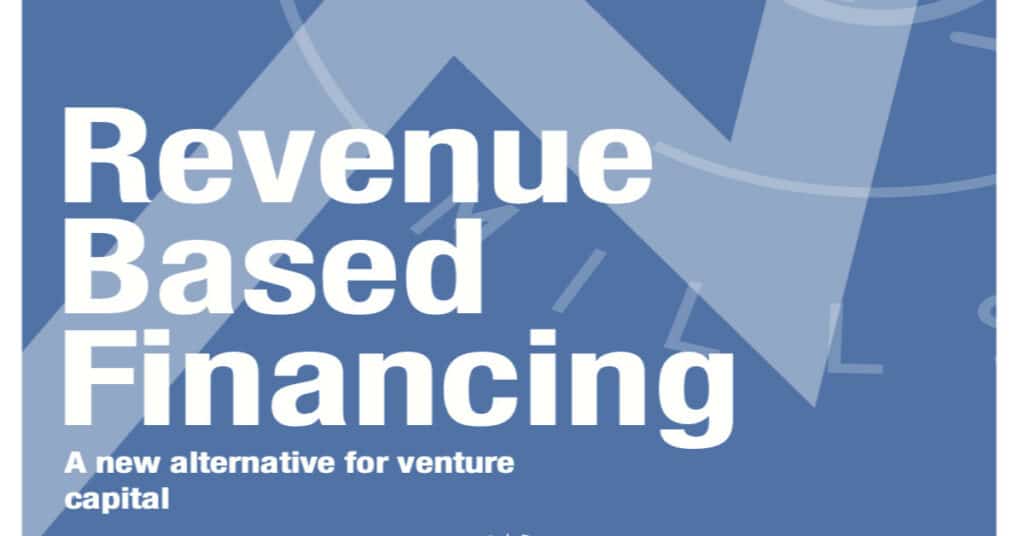Is revenue-based financing (RBF) the real alternative to venture capital?
This question has dominated the minds of investors for a long time and they might finally be finding the answer.
Often seen as a hybrid between debt and equity financing, RBF offers a way for entrepreneurs to raise funding without diluting their holding.
As funding dries up for startups across the board, entrepreneurs are looking for alternative funding and RBF is placed to benefit.
What is revenue-based financing (RBF)?

Revenue-based financing (RBF) is an alternative financing method for businesses looking to raise capital from investors.
In exchange for the money invested, investors get a percentage of the ongoing gross revenue of the business until a predetermined amount is paid.
RBF is not a new fundraising mechanism and is already used to finance a number of municipal projects. However, it is now becoming a viable alternative for entrepreneurs as well.
If venture capital supports early stage and moonshots, then RBF mostly supports financially prudent or late stage companies.
Gijs den Hartog, an early stage investor and partner at Capital Mills, says RBF is “already an emerging asset class in the US” but remains unknown in Europe.
Dutch VC Capital Mills offers both equity and RBF funding, but its focus is late seed venture capital. “We have developed our RBF offering primarily as an alternative for venture capital,” says Gijs.
Since 2019, Capital Mills has closed 12 RBF investments of around €4M and is now announcing Fortibus 7, its latest RBF fund.
Fortibus 7: what you need to know about this RBF?
For Capital Mills, the revenue-based financing (RBF), has proven to be an attractive way to invest in entrepreneurs and private companies.
With Fortibus, Capital Mills plans to invest a total of €12.5M in 15 or more companies within the next 12 to 24 months.
The VC has already closed €7.5M in commitment from over 24 investors who are part of its investor network. The final close of Fortibus 7 is expected in May 2023 with possibility of new investors participating in the RBF fund.
However, the unfamiliar nature of RBF in Europe remains a challenge for investors like Capital Mills. Gijs says, “When talking to founders, we really had to explain the concept.”
He adds that fintech startups offering RBF like Lighter Capital, Clearco, and Uncapped, have helped familiarise the market with revenue-based financing.
Personal health platform Drimpy, social media marketing platform GladCloud, and PressPage are the first three startups to receive funding.
For its Fortibus 7 fund, Capital Mills is looking at companies with predictable business models in SaaS or e-commerce businesses with a high gross margin. “They need to be cash break-even or break-even in sight,” Gijs explains.
The investment ticket starts from €250,000 and businesses with minimum revenue of around €500,000 or closer to €1M are supported.
State of revenue-based financing (RBF)

“RBF is not for everyone,” cautions Gijs as he explains how alternative financing remains a niche.
He says the revenue-based financing is not for startups chasing moonshot ideas or those that can only be served by venture capitalists through equity financing.
RBF, he says, is a better fit for startups that are profitable and able to support the repayment cap, which varies between 1.5 and 2.5 times the RBF investment. In comparison to venture capital, RBF is faster and cheaper to raise since there is no dilution and even allows for easier governance.
“It can be a better strategic fit if you do not want to raise the usually big amounts you get when raising venture capital,” says Gijs.
While awareness remains a challenge, Gijs says Capital Mills is seeing more interest from startups in the Netherlands, especially in the last twelve months.
He also doesn’t see RBF becoming a norm despite the harsher funding climate. “Every founder that has been confronted with difficulties fundraising in a harsher environment has become much more conscious of the dynamics of venture capital investing,” he adds.
In the current economic landscape, Gijs sees RBF as an obvious choice for qualifying companies. For investors, it is an attractive way to build an asset light profile that also comes with a monthly payout.
As Capital Mills prepares to close Fortibus 7, its biggest RBF fund yet, Gijs sees the model getting better with time.
“Some of the business models might work better than others,” he says, “and that will become clear in the next few years.”










01
From telecom veteran to Dutch Startup Visa success: The Jignesh Dave story